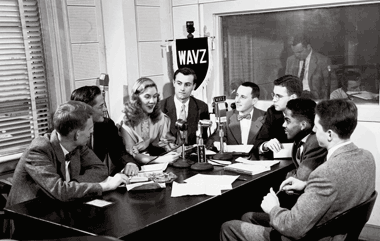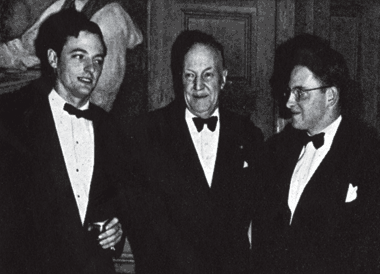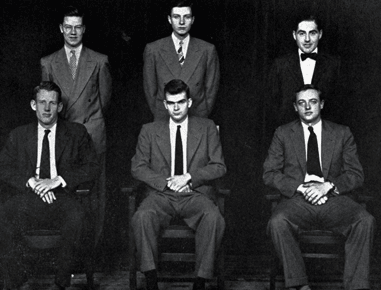
 |
||
The Yale Alumni Magazine is owned and operated by Yale Alumni Publications, Inc., a nonprofit corporation independent of Yale University. The content of the magazine and its website is the responsibility of the editors and does not necessarily reflect the views of Yale or its officers. |
|
Replacing one orthodoxy with another Reading your three fine retrospectives on William F. Buckley, I found it interesting that in his attack on Yale he sought to challenge the “unacknowledged biases of a liberal orthodoxy” by trying to impose the equally unacknowledged biases of a conservative one, not by encouraging an examination of orthodoxies themselves. It seems that the young Mr. Buckley had not learned that the most dangerous idea in the world is in fact the one you want to believe, since it is this idea that you are least willing to examine critically. Nothing charming about Buckley’s campaign If someone was ever at the receiving end of what David Frum describes as a new “tradition” and what I describe as bigotry, the Buckley persona goes from charming to scary … or worse. At least, hidden in the Gaddis Smith article is the remark “Buckley admired McCarthy.” In the Tanenhaus article, the statement “almost every allegation [about political purges on the Yale campus] in the Crimson articles was true” indicates pretty much what Willmoore Kendall and Buckley were up to, then and for the next 50 years. There is nothing charming about a bunch of wealthy conservatives going after many unassuming idealists and liberals, and I was at the receiving end of a lot of that attitude as a 16-year-old anticommunist liberal in public high school and elsewhere. For those persons whose careers were wrecked by Kendall, Buckley, et al., it must have been much more serious. “Buckley is responsible for what we have today” It seems to me that William F. Buckley played a harmful role in the history of this country 50 years ago. His activities were part of a largely irrational Red Scare—comparable to the one after the First World War—that involved Senator Joseph McCarthy’s demagogic charges and the harassment by the House Un-American Activities Committee of people who could not bring themselves to inform on their friends. Yes, there were some communists in the government, but hardly enough to warrant the persecution and terror that went on. Buckley and [classmate L. Brent] Bozell made it all look intellectually respectable. If Buckley is one of the authors of modern conservatism, then he is partly responsible for what we have today: a president who takes his orders from “God,” who declares a “crusade” in the Middle East, and who sets out to destroy Social Security, Medicaid, Medicare, and all the works of the New and Fair Deals. All this from a man who inherited his millions, whose hobby was ocean yacht racing, and who feels entitled to tell ordinary people what they need and do not need from the government. Bozell’s political migration I write concerning the lower photo on page 67 of the May/June 2008 issue. L. Brent Bozell Jr. is pictured as seated on the far left in the photo, a stance that seems appropriate to his political position at the time. When I knew him, in our freshman year in 1946, we were both members—and supporters, I must believe—of the United World Federalists. Given his subsequent radical shift in political position, brought on, I suppose, by his impending marriage to Buckley’s sister, he should have been seated on the far right. This is the sole instance of such a radical shift in political position caused by, I believe, an impending wedding. Buckley would laugh Bill at his best would have had a great big guffaw over the cover story, which does a bang-up job of confusing hagiography with obituary. Could our professional Bad Boy have actually kept a straight face when that Innocent Economist, President Levin, saw fit to give Bill an honorary degree for his concertedly frivolous, albeit precocious, attempt to destroy all that was best of Mother Eli in writing God and Man at Yale? Yes, it was The May/June article about dinosaurs was immediately followed by the writing about Bill Buckley. Coincidence? The next administration
I was surprised that you did not identify the person in the picture on page 62 with Bill and President Seymour. He is Garry Ellis '51, who succeeded Bill as chairman of the YDN and was Bill’s political polar opposite. The fellow in the bow tie
In case this has not been called to your attention: in the photo of the Yale debate team in the Buckley article, the man standing behind Buckley is not a member of the team. It is Professor Rollin J. Osterweis, the coach. A left-wing liberal’s fond remembrance Your articles triggered a memory of standing next to William F. Buckley at a hotel’s registration desk. Despite being a left-wing liberal since my teens, I loved reading his syndicated editorials and watching his urbane, hypnotically serpentine approach toward “my kind” of politicos on TV’s Firing Line. As a closeted gay with a pregnant wife, I was also stunned in 1968 when, with eye-popping fury, he denounced Gore Vidal as “you queer!” during the live telecast of the Democrat convention. In addition, he was “a true son of Yale College,” whereas I was just one of the university’s graduate foundlings. Thus, years later, I said nothing to him when chance gave opportunity. However, I still retain the fondness of observing his gracious kindness with the lispingly gay clerk who was desperately trying to sort out a mistake the hotel had made in his reservation. Buckley had a conservative’s noblesse oblige, but without condescension. Change on the air Thank you for your excellent retrospective on Bill Buckley. However, I must point out a small piece of what was certainly unintended irony: on page 67, the Yale Political Union’s radio program is shown, carried on WAVZ. According to the Connecticut Broadcaster’s Association’s 2005 pamphlet on Connecticut radio history: In 2004, WAVZ began carrying the Air America radio network, and thus became the first liberal talk station in Connecticut. Buckley’s alumni magazine encomium forever bears the banner of a radio station that made history as “liberal talk radio.” Irony doesn’t get more ironic than that. Or, as a liberal might quote from what must have been one of WFB’s favorite publications, “Vengeance is mine, I will repay, saith the Lord.” Actually, Buckley may have the last laugh: WAVZ dropped Air America and went to an all-sports format in 2007.—Eds. Bill and Jimi and me In the fall of 1968, my first year at Yale, there were two guys whose effect on me was absolutely hypnotic: Bill Buckley and Jimi Hendrix. For psychedelic toryism it was the best of all possible years. What did Buckley learn at Yale? The various portraits of William F. Buckley, Jr. raise two deep and disturbing questions about Yale and the education it provides students. First, did Yale actually educate Bill Buckley? The three portraits suggest Mr. Buckley left Yale much as he arrived. He hardly changed during his time. Indeed, the articles by Gaddis Smith and Sam Tanenhaus suggest he hardly examined the truth or validity of his basic beliefs in four years at Yale. What then was the precise education he received? Isn’t the purpose of a liberal education at an institution like Yale to force students to critically examine themselves, their beliefs, their assumptions, their place in the world? Nothing suggests this was part of Mr. Buckley’s experience at Yale. Indeed, Tanenhaus suggests that while he was an elegant and erudite writer, he was a confused student and hardly read, much less intellectually pondered, the books he was assigned: “The lucid force of his prose, duly noted by Weiss, compensated for the unexamined ideas . … In other words, he hadn’t read past Chapter Ten of Macaulay’s History of England. “ He seems to have received very high marks despite not having read Aquinas, Kant, Macaulay and other great writers assigned in his courses much less understood what they were arguing. (Wouldn’t we call this grade inflation?) Hiding unexamined prejudices beneath wonderful prose is hardly the stuff a great education is supposed to tolerate. Isn’t the purpose of a Yale liberal education to make students lead an examined life? Does Buckley’s Yale experience constitute educational malpractice? Second, Yale men provide the bookends of the conservative movement during the second half of the 20th century. It is hard to read the portraits of Bill Buckley without thinking of George W. Bush. Both seem to embrace a naïve view about the world and how its institutions should work; both see the world in simplistic “either-or” “good-bad” ways; and both are all too ready to embrace the use of innuendo, half-truths, and outright falsehoods to further their agenda. In Buckley’s case he was, in God and Man at Yale, naïve about the role of an institution of higher learning in the 20th century; he was simplistic in reducing everything to dichotomous battles: Christianity vs. atheism, capitalism vs. communism; and the book was filled with innuendo and dishonest, half-truths, and willingness to smear worthy professors. Certainly, Buckley was much more articulate and verbally self-assured than President Bush, but their core perspectives and means to achieve their ends seem too similar for comfort. Is all that separates them the size and range of their vocabularies and oratorical skills? That these two figures, from the start and now end of the most recent phase of American conservatism, were moneyed, Bonesmen elites at Yale should give us pause and force us to ask again what was the education Yale provided these men? Why were such naïvete, simplicity of analysis, and disreputable methods thought to be tolerable, even laudatory, by men educated at Yale? Prodigious, Not Prodigal, Son While word quibbles are rarely necessary with your fine publication, I do wonder whether “prodigal” is an apt adjective for this legend of Yale, especially for one who was so proud of his own religious (as well as political and social) orthodoxy. Thank you for a fine issue celebrating his remarkably productive life, both in words and in deeds. There have been, and will continue to be, many praises and critiques of Bill Buckley, but I don’t think anyone can fault him for his remarkably prodigious, diverse, and invariably entertaining and informed output. This prodigy continued to be productive from his somewhat dissatisfied but very successful beginnings at Yale and throughout his many challenges and triumphs thereafter. Buckley and Jim Crow So David Frum thinks that W.F. Buckley’s God and Man at Yale was "a critique written in love.” When Buckley wrote in his infamous National Review apologetic for Jim Crow in 1957, that “The central question that emerges is whether the White community in the South is entitled to take such measures as are necessary to prevail, politically and culturally, in areas in which it does not prevail numerically? The sobering answer is Yes—the White community is so entitled because, for the time being, it is the advanced race,” was that written in love? If so, for who or what? And with what odious consequences? He was a stone racist. Two votes for Buckley My first recollection of Buckley is a letter from a high school friend from Queens, New York, on the then-recent 1964 presidential and New York mayoral elections. He revealed that he, very much the social left-wing liberal, voted for both Barry Goldwater and WFB. (So did I.) His reason: an unabashed love of our country, without reservation, and all that that truly means. |
||||||||||||||
|
|
|
|
|
|
|
|
©1992–2012, Yale Alumni Publications, Inc. All rights reserved. Yale Alumni Magazine, P.O. Box 1905, New Haven, CT 06509-1905, USA. yam@yale.edu |
||


